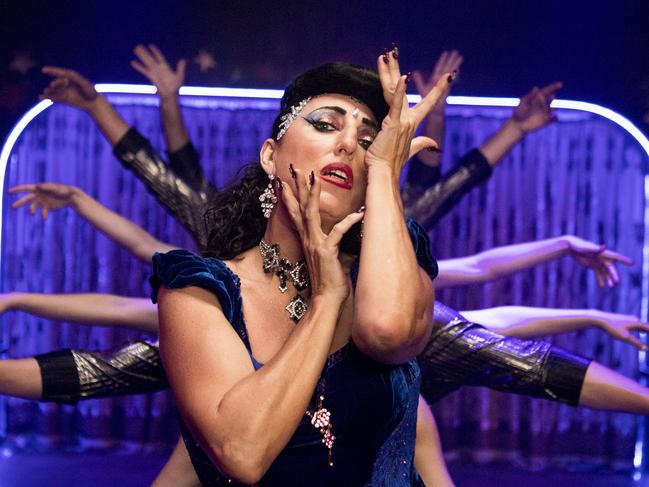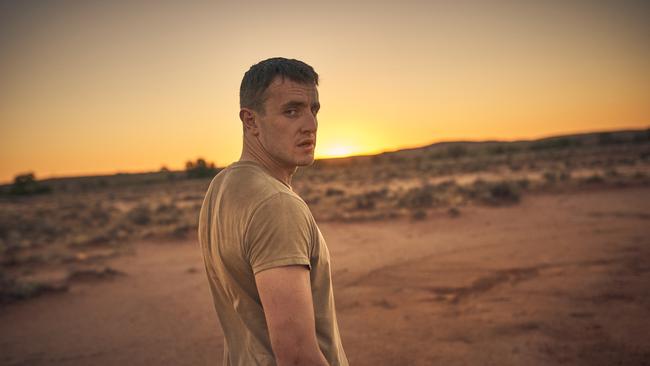Carmen, starring Paul Mescal, was largely filmed around Broken Hill in NSW
Bizet’s opera is exhilarating, to be sure, but the narrative appears to take a dim view of a woman’s freedom to choose her partner and also appears to endorse domestic violence.

Carmen (M)
In cinemas from Thursday
★★½
I must confess that I’ve never quite understood the popularity of Carmen; Bizet’s opera is exhilarating, to be sure, but the narrative, in which a gypsy girl seduces Don Jose, a soldier, who deserts his unit for her after which she transfers her attentions to a toreador, Escamillo, before meeting a nasty fate at the hands of her discarded lover, appears to take a dim view of a woman’s freedom to choose her partner and also appears to endorse domestic violence. A jealous, murderous man and a fickle faithless woman – what’s to like here?
Yet since Prosper Merimee wrote the novella, Carmen, in 1845 and Georges Bizet adapted it into an opera exactly 30 years later – an opera that scandalised Parisian audiences at its premiere – the piece has rarely been allowed to rest. In addition to the countless theatrical productions of the opera, there have been numerous film versions of the story. In 1915, the year D.W. Griffith released the first American film epic, The Birth of a Nation, two (silent) film versions were produced, one directed by Raoul Walsh with Theda Bara (an exotic actor who assured her fans that her name meant “Arab Death”) and Cecil B. DeMille with Geraldine Farrar. Twelve years later, Walsh had another go at the material with The Loves of Carmen starring Dolores del Rio. Rita Hayworth played the role in 1948 in a film also titled The Loves of Carmen – Australian actor Ron Randell was in that one – and then there was Otto Preminger’s 1954 film version of the Broadway hit Carmen Jones – a modernised version with an all-black cast that included Harry Belafonte and Dorothy Dandridge. In 1983, there came a typically perverse version from French master Jean-Luc Godard, Prenom Carmen (First Name Carmen) which added a terrorist cell to the familiar story. Perhaps the best of all, also made in 1983, was Spanish director Carlos Saura’s exhilarating flamenco version, which was titled, simply, Carmen.
I’ve probably forgotten some others but the latest film to feature Merimee’s characters, also titled, simply, Carmen, is one of the most unusual. For one thing, though set in the present on the US-Mexico border, it was mostly filmed around Broken Hill in NSW.
First-time movie director Benjamin Millepied, who is better known for his on-stage appearances as a star of ballet, has scripted a very loose adaptation of the story in collaboration with Loic Barrere and Alexander Dinelaris; the screenplay channels Merimee but also Alexander Pushkin’s poem, The Gypsies. The dance sequences feature not only flamenco but also hip-hop and ballet. The resulting mix will, I suspect, be very much an acquired taste.
In addition, the well-known narrative has been so extensively re-worked in this version that it’s almost unrecognisable. Why film Carmen if you’re going to change most of the key elements of the famous story?
Millepied’s film, a French-Australian co-production, tells the story of Aidan (Paul Mescal, the Oscar nominated actor from Aftersun), a young veteran of the Afghan War, who befriends Carmen (Melissa Barrera), a refugee from the other side of the border. Aidan is working as a border guard but is so appalled by the racist attitudes of some of the senior guards that he shoots one of them. He and Carmen then team up to flee to Los Angeles. There they are offered temporary sanctuary by Masilda (Rossy de Palma).
Unfortunately, some of the dance sequences are poorly filmed with the camera edging too close to the dancers so that the lower halves of their bodies are off-screen – Fred Astaire would never have stood for such a thing and it seems odd that, with his background in classical dance, Millepied would allow his cinematographer, Jorg Widmer, to cover some of the dancing in this way.
The film features plenty of dance and the occasional song, but there’s no sign of Bizet’s music.
In the end, Carmen is something of an enigma; the actors are fine, though Mescal is clearly not a professional dancer, and it’s good to glimpse Tara Morice (of Strictly Ballroom fame) in a small role – but fans of Merimee and Bizet will probably come away feeling frustrated.

Other People’s Children (Les enfants des autres) (M)
In cinemas
★★★★
An everyday story unfolds with deceptive simplicity in the poignant and appealing Other People’s Children, the latest film from writer-director Rebecca Zlotowski. This French film delves into the lives and the problems of recognisably real characters with delicacy and nuance.
The central character is Rachel, played by the beguiling Virginie Efira – who is blessed with a most infectious laugh. Rachel is a high-school teacher who is nearing the age of 40. Unmarried and childless, she has reached the age where her options regarding motherhood are closing in, as her gynaecologist, played, in an unexpected piece of casting, by the American documentary filmmaker Frederick Wiseman, advises her.
Rachel is close to her younger sister, Louana (Yamee Couture), and her father (Michael Zlotowski) but otherwise she is alone. However, she’s a modern, independent woman, and a Frenchwoman at that, and so she’s not about to complain too much.
Things change when she begins an affair with Ali (Roschdy Zem) who is separated from his wife, Alice (Chiara Mastroianni). The fact that Rachel is Jewish and Ali is Arabic isn’t underlined and plays no part in the relationship.
To start with the affair is, for Rachel, fulfilling and sexy. She gazes on Ali’s body as he takes a shower, and she exudes a palpable feeling of satisfaction and horniness.
Then Rachel meets Leila (Callie Ferreira-Goncalves), Ali’s four-year-old daughter. And she experiences an almost instant empathy with the little girl. Can Leila fill the gap in Rachel’s life? Ali seems perfectly happy to have Rachel take over the role of stepmother, and to become a surrogate parent, so she bonds with the child – who is, at times, a bit confused as to just who this kindly woman is.
This deceptively simple story is neatly fleshed out with interesting subsidiary characters, including a Muslim woman, Jeanne (Anne Berest), suffering from cancer, Dylan, a student (Victor Lefebvre) with problems, and Vincent, a fellow teacher (Henri-Noel Tabary) who thinks he’s in love with Rachel – a scene in which she gently turns him down is beautifully handled.
When Louana becomes pregnant there are more family issues to explore, all of them handled with dexterity and empathy by the writer-director. Zlotowski is working in much the same territory as her compatriot, Mia Hansen-Love, but Other People’s Children is on the whole more sympathetic and more absorbing than most other contemporary French films.

